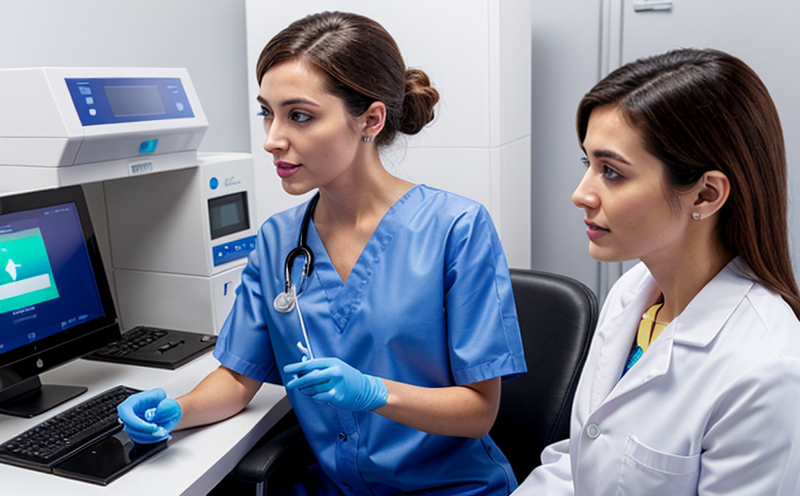qPCR Testing for Campylobacter in Poultry Production
In recent years, poultry production has faced significant challenges due to the presence of Campylobacter bacteria. These bacteria are a leading cause of foodborne illness worldwide and can pose serious public health risks if not properly managed. Quantitative Polymerase Chain Reaction (qPCR) testing is an advanced molecular diagnostic tool that offers rapid, accurate, and sensitive detection of Campylobacter species in poultry production environments.
The qPCR method involves amplifying a specific region of the target DNA or RNA through multiple cycles of heating and cooling, which allows for millions of copies to be generated. This process makes it highly reliable for detecting even trace amounts of pathogens such as Campylobacter jejuni and C. coli. The technology is particularly valuable in poultry farms where early detection can prevent outbreaks and mitigate associated health risks.
At Eurolab, our qPCR testing services are specifically tailored to meet the stringent requirements of the poultry industry. Our approach ensures that every step from sample collection to final report is conducted with precision and accuracy using cutting-edge technology. This includes thorough specimen preparation processes designed to enhance the sensitivity and specificity of the test results.
The use of qPCR in Campylobacter detection offers several advantages over traditional culturing methods. For instance, it eliminates the need for prolonged incubation periods, reducing turnaround times significantly. Additionally, qPCR can identify viable as well as non-viable cells, providing more comprehensive data about pathogen presence and distribution within a sample.
To ensure reliability, we adhere to international standards such as ISO 17025 for our laboratory practices. Our facilities are equipped with state-of-the-art qPCR machines from reputable manufacturers like Applied Biosystems (Thermo Fisher Scientific) and Bio-Rad Laboratories. These instruments provide consistent results across all tests, contributing to the credibility of our findings.
By implementing qPCR testing early in the production cycle, farmers and processors can take proactive measures against Campylobacter contamination. This not only helps maintain food safety standards but also enhances consumer confidence in poultry products. Furthermore, regular monitoring using this method allows for continuous improvement strategies aimed at reducing incidences of campylobacteriosis.
In summary, qPCR testing represents a powerful tool in the fight against Campylobacter within the poultry sector. Its ability to quickly and accurately detect these harmful bacteria makes it an indispensable component of modern food safety protocols. At Eurolab, we pride ourselves on providing comprehensive services that support our clients' efforts towards maintaining high standards of hygiene and quality.
Benefits
The implementation of qPCR testing for Campylobacter in poultry production provides numerous benefits beyond just detection. These include:
- Faster Results: Traditional methods can take days or even weeks, whereas qPCR yields results within hours.
- Precision: It allows for precise quantification of pathogen levels, which is crucial for effective management.
- Viability Detection: Differentiates between viable and non-viable cells, offering a more accurate picture of the contamination status.
- Cost-Effective: By preventing larger outbreaks through early intervention, it can save costs associated with recalls or increased production expenses.
These factors contribute to enhanced operational efficiency and improved product quality, ultimately benefiting both producers and consumers alike.
Industry Applications
- Poultry Farms: Regular testing helps in identifying potential sources of contamination early on.
- Processing Plants: Ensures that processed products meet stringent food safety regulations.
- Retail Outlets: Provides assurance to consumers about the hygiene standards followed during manufacturing processes.
- Research Institutions: Supports scientific studies related to pathogen behavior and control methods.
The versatility of qPCR testing makes it applicable across various stages of poultry production, from farm to table, ensuring continuous surveillance against Campylobacter contamination.
Eurolab Advantages
At Eurolab, we offer unparalleled expertise and comprehensive services in qPCR testing for Campylobacter in poultry production. Our key advantages include:
- ISO 17025 Accreditation: Ensuring the highest level of reliability and accuracy.
- Advanced Equipment: Utilizing top-tier qPCR machines to provide consistent results.
- Expert Team: Comprising highly trained professionals specializing in molecular diagnostics.
- Comprehensive Reporting: Providing detailed reports tailored to meet specific client needs.
We take pride in delivering services that not only comply with international standards but also go beyond expectations, supporting our clients' goals effectively and efficiently.





